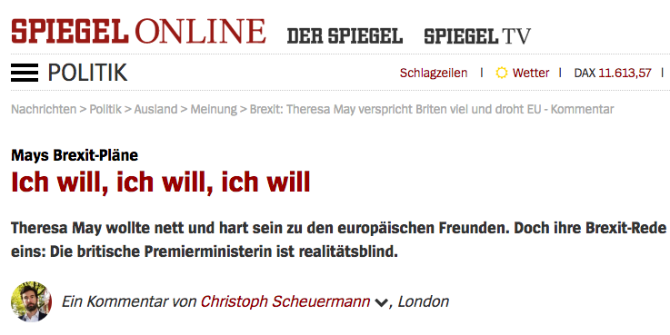 What was the German reaction to Theresa May’s Lancaster House speech? Inez von Weitershausen says the responses ranged from anger and disappointment to more hopeful calls for a constructive relationship with the UK following Brexit.
What was the German reaction to Theresa May’s Lancaster House speech? Inez von Weitershausen says the responses ranged from anger and disappointment to more hopeful calls for a constructive relationship with the UK following Brexit.
Those commentators suggesting that Germany’s reaction to Theresa May’s Lancaster House speech is one of Schadenfreude discard one crucial fact: the government of Angela Merkel has, along with most German citizens, a rather distinct idea of the purpose and added value of the European Union. While aware of the material benefits which Germany derived from the integration process initiated by the Treaty of Rome in 1957, most Germans do not reduce the EU to its economic component and the wider benefits associated with a common market. Rather, alongside many other member states – in particular the other five founding members France, Italy, Belgium, Netherland and Luxemburg – they overwhelmingly regard the Union as a guarantor for peace in Europe.

The high levels of support for the EU in Germany are also rooted in the fact that most Germans see the EU as a place where novel forms of social organisation have successfully been tried, and where a commitment to multilateralism, negotiation and civil forms of crisis management have trumped ‘balance of power’ politics, coercion and perceptions of power that rely predominantly on military capabilities. It is against this background that the initial reactions of many German politicians, the mainstream media and citizens to Mrs. May’s speech have to be understood.
Among the former group, foreign minister Frank-Walter Steinmeier (SPD) was quoted as having underlined the need for “continued constructive engagement” with the United Kingdom, while the vice president of the European Parliament, Alexander Graf Lambsdorff, suggested that “fair treatment” was crucial. In contrast to this conciliatory approach, stood the initial reaction by Reinhard Bütikofer, Member of the Greens/EFA in the European Parliament, who declared that Mrs May did not succeed in “sugar-coating with friendly words the radical nature of her politics”.
Similarly, a piece from Christoph Scheuermann in Der Spiegel noted that rather than seeking a conciliatory approach, May had presented a catalogue of demands, “topped up with some threats”, pointing out that many of her sentences had begun with the words “I want.“ Germany’s principal public news broadcasting radio station, Deutschlandfunk came to a similar conclusion, stating that while legitimate, May’s ‘divorce plans’ left no ambiguities, and were likely to trigger an equally self-interested response by the other 27 EU member states.
Hours after May’s announcement of what has been termed a ’hard Brexit’, German public opinion very much reflected these different attitudes. In the online discussion forum of the Sueddeusche Zeitung, for instance, some readers saw little reason for worry as they perceived the EU’s negotiation position to be considerably stronger than that of the United Kingdom, while others deplored a new kind of “British ‘fairness’ built on threats”. Other voices suggested that Mrs May merely carried out the wish of the majority of British voters and acted in a way they considered “appropriate for the homeland of democracy”, whereas sceptics of this position placed ‘hard Brexit’ in a larger, international context, concluding that “this is bad for all Europeans and good for Putin & Co”.
The latter statement also broadly reflects the position of Sueddeutsche Zeitung itself, which argued that Europe was now obliged to make ‘Brexit’ sufficiently expensive to prevent other countries from following suit, suggesting that “the more the UK government pushes for sovereignty and tries to take an unduly independent line, the higher the tariffs and barriers” should be.
In order to contextualise statements such as the above, it is necessary to recall, however, that Berlin never wished for London to leave the EU in the first place, and that in particular Angela Merkel had made numerous attempts to accommodate demands by former Prime Minister David Cameron, in an effort to support the UK’s continued membership. Even seemingly harsh statements by some officials, commentators and the public must thus be understood against an overall positive attitude towards the United Kingdom.
This is also reflected in commentary by the Frankfurter Allgemeine Zeitung, which ends its lead article on the issue with an appeal for continued cooperation. Suggesting that “the EU of 27 and Britain should do anything they can in order to ensure that the division does not turn into another ‘Wars of the Roses’, and that the prospect for a close and cooperative relationship ‘post-Brexit’ is not challenged”.
Apparently not quite as willing to accept the outcome as the final verdict yet, was Germany’s main tabloid, BILD. In addition to underlining the potentially crucial role of the European Parliament in the Brexit process, the newspaper also quoted an interview with LSE Professor Iain Begg from May 2016, in which he attested that May had shown “wishful thinking” with regard to her desire to replace the common market and the customs union with some sort of a free trade area.
What is clear is that with the general tone of responses in Germany reflecting either anger, disappointment, or a form of (perhaps vain) hope, Schadenfreude fails to adequately describe the German reaction to the United Kingdom’s first step out of the European Union.
This post represents the views of the author and not those of the Brexit blog, nor the LSE. It first appeared at LSE EUROPP.
Inez von Weitershausen is currently a teacher on the LSE100 course and a PhD candidate in the LSE’s Department of International Relations. Her thesis is on European foreign policy during the 2011 uprisings in Libya.







“that Europe was now obliged to make ‘Brexit’ sufficiently expensive to prevent other countries from following suit, suggesting that “the more the UK government pushes for sovereignty and tries to take an unduly independent line, the higher the tariffs and barriers” should be”
Says it all
Typical Brexiteer shtick. Focus on the jaded responses of the most vindictive European commentators and pretend that settles it all.
I am predisposed to a fair, gentle deal with the United Kingdom (the only option the Tory government seem to consider is a FTA, not that it’s going to prevent the economic harm from leaving), but any new arrangement will realistically take several years to hammer out and if the government try a race to the bottom on corporate tax rates it’s fair for the EU to raise barriers to protect themselves from leeching. What do you expect?
The Spiegel article mentioned is available here in English:
http://www.spiegel.de/international/europe/theresa-may-promises-a-glorious-brexit-future-a-1130529.html
– Iggy
Typical Europhile dissembling
This Britain must be punished to deter anyone else of thinking of leaving the EU isn’t just confined to a few “vindictive” commentators, it is prevalent amongst a range of leaders in the EU.
I too hope for a mutually beneficial deal between the UK and the EU and why shouldn’t that be a FTA?
Any economic harm from our leaving the EU is likely to be short term and is a small price to pay for leaving the EU.
There is absolutely no reason at all why any new arrangement(s) should take several years to agree, this is just typical of the disabling bureaucratic nature of the EU and why it is shambolic and slow to address any issues / problems which arise.
If the people so passionate about the EU believe that we are the only country which will eventually leave the EU, they are fooling themselves.